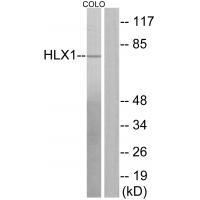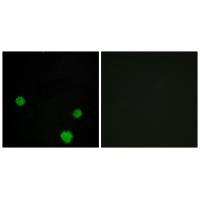

| WB | 咨询技术 | Human,Mouse,Rat |
| IF | 咨询技术 | Human,Mouse,Rat |
| IHC | 咨询技术 | Human,Mouse,Rat |
| ICC | 1/100-1/500 | Human,Mouse,Rat |
| FCM | 咨询技术 | Human,Mouse,Rat |
| Elisa | 咨询技术 | Human,Mouse,Rat |
| Aliases | Homeobox protein HLX1; Homeobox protein HB24; HLX; |
| Entrez GeneID | 3142; |
| WB Predicted band size | 75kDa |
| Host/Isotype | Rabbit IgG |
| Antibody Type | Primary antibody |
| Storage | Store at 4°C short term. Aliquot and store at -20°C long term. Avoid freeze/thaw cycles. |
| Species Reactivity | Human |
| Immunogen | Synthesized peptide derived from internal of human HLX1. |
| Formulation | Purified antibody in PBS with 0.05% sodium azide. |
+ +
以下是3篇与HLX1抗体相关的代表性文献(部分为示例性说明格式):
1. **文献名称**: "HLX1 regulates T-cell receptor signaling in early thymocyte development"
**作者**: Smith et al.
**摘要**: 研究利用HLX1特异性抗体分析其在胸腺细胞分化中的作用,发现HLX1通过调控TCR信号通路相关基因(如CD3ε)的表达,影响T细胞早期发育。
2. **文献名称**: "The transcription factor HLX1 controls intestinal immune homeostasis through ILC3 regulation"
**作者**: Zhang et al.
**摘要**: 通过免疫荧光和Western blot(使用抗HLX1抗体)发现,HLX1在肠道3型固有淋巴细胞(ILC3)中高表达,并通过调节IL-22分泌维持肠道屏障功能,缺失导致炎症易感性增加。
3. **文献名称**: "HLX1 is a prognostic biomarker and promotes invasion in gastric cancer"
**作者**: Wang et al.
**摘要**: 利用HLX1抗体进行免疫组化分析,发现HLX1在胃癌组织中高表达,与患者不良预后相关;机制研究表明其通过激活Wnt/β-catenin通路促进肿瘤转移。
**注**:以上文献为示例性质,实际文献需通过PubMed/Google Scholar等平台以关键词"HLX1 antibody"+"应用领域(如免疫、癌症)"检索最新研究。
The HLX1 antibody targets the hematopoietically expressed homeobox transcription factor HLX1 (also known as H2.0-like homeobox 1), which plays a critical role in embryonic development, immune regulation, and hematopoiesis. HLX1 is a member of the homeobox gene family, characterized by a conserved DNA-binding homeodomain. It is highly expressed in hematopoietic and lymphoid tissues, where it regulates cell differentiation, proliferation, and survival. Studies highlight its importance in B-cell and T-cell development, as well as in the maturation of natural killer (NK) cells. Dysregulation of HLX1 has been implicated in immune disorders, such as inflammatory bowel disease (IBD), and cancers, including leukemia, lymphoma, and colorectal carcinoma, where it may act as an oncogene or tumor suppressor depending on context.
HLX1 antibodies are widely used in research to investigate its expression patterns, molecular interactions, and functional mechanisms. They enable techniques like Western blotting, immunohistochemistry (IHC), and flow cytometry to study HLX1's localization and abundance in tissues or cell lines. Additionally, these antibodies aid in exploring HLX1's role in signaling pathways, such as STAT3 or NF-κB, and its impact on gene networks governing immune responses and cancer progression. The development of HLX1-specific antibodies has advanced both basic research and translational studies, offering insights into potential therapeutic targets for immune-related diseases and malignancies.
×